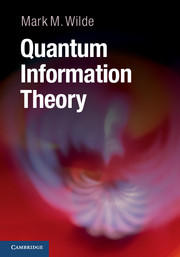Book contents
- Frontmatter
- Contents
- How To Use This Book
- Acknowledgments
- Part I Introduction
- 1 Concepts in Quantum Shannon Theory
- 2 Classical Shannon Theory
- Part II The Quantum Theory
- Part III Unit Quantum Protocols
- Part IV Tools of Quantum Shannon Theory
- Part V Noiseless Quantum Shannon Theory
- Part VI Noisy Quantum Shannon Theory
- Appendix A Miscellaneous Mathematics
- Appendix B Monotonicity of Quantum Relative Entropy
- References
- Index
2 - Classical Shannon Theory
from Part I - Introduction
Published online by Cambridge University Press: 05 May 2013
- Frontmatter
- Contents
- How To Use This Book
- Acknowledgments
- Part I Introduction
- 1 Concepts in Quantum Shannon Theory
- 2 Classical Shannon Theory
- Part II The Quantum Theory
- Part III Unit Quantum Protocols
- Part IV Tools of Quantum Shannon Theory
- Part V Noiseless Quantum Shannon Theory
- Part VI Noisy Quantum Shannon Theory
- Appendix A Miscellaneous Mathematics
- Appendix B Monotonicity of Quantum Relative Entropy
- References
- Index
Summary
We cannot overstate the importance of Shannon's contribution to modern science. His introduction of the field of information theory and his solutions to its two main theorems demonstrate that his ideas on communication were far beyond the other prevailing ideas in this domain around 1948.
In this chapter, our aim is to discuss Shannon's two main contributions in a descriptive fashion. The goal of this high-level discussion is to build up the intuition for the problem domain of information theory and to understand the main concepts before we delve into the analogous quantum information-theoretic ideas. We avoid going into deep technical detail in this chapter, leaving such details for later chapters where we formally prove both classical and quantum Shannon-theoretic coding theorems. We do use some mathematics from probability theory, namely, the law of large numbers.
We will be delving into the technical details of this chapter's material in later chapters (specifically, Chapters 10, 12, and 13). Once you have reached later chapters that develop some more technical details, it might be helpful to turn back to this chapter to get an overall flavor for the motivation of the development.
Data Compression
We first discuss the problem of data compression. Those who are familiar with the Internet have used several popular data formats such as JPEG, MPEG, ZIP, GIF, etc. All of these file formats have corresponding algorithms for compressing the output of an information source.
- Type
- Chapter
- Information
- Quantum Information Theory , pp. 26 - 50Publisher: Cambridge University PressPrint publication year: 2013



